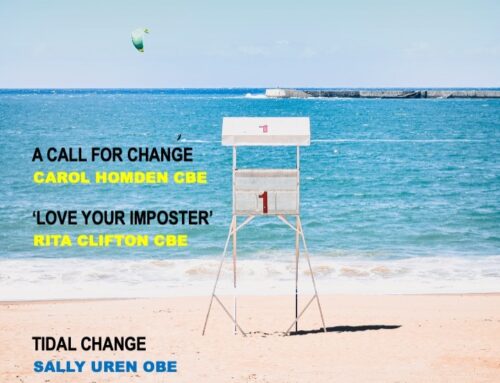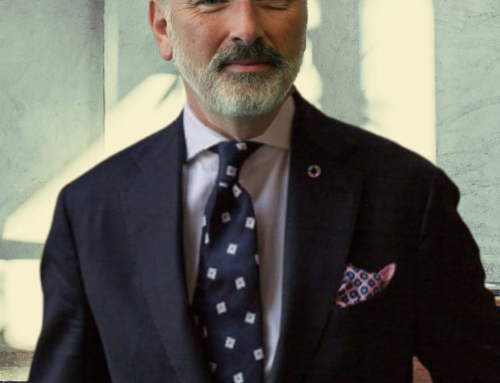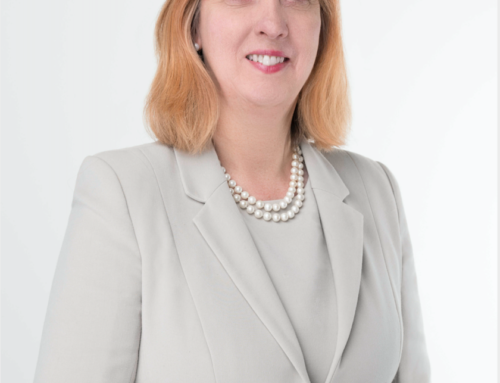A Kinder View of The World

I’ve swapped a life of leading science expeditions, presenting BBC documentaries, travelling extensively for conferences and personal adventures for being a semi-professional Zoomer. For many years my ambitious travel diary was a source of personal pride and demonstrated enthusiasm for working on the right projects. I always said “yes” and enjoyed that sense of making things happen by overcoming tricky logistics to be on site.
On my return here to Geneva in March, after a month of work in Norway and the Seychelles, I openly celebrated not travelling. What luxury! With a green screen for those all–important virtual backgrounds and a professional microphone I was in business fast, saying yes to even more engagements and working across all time-zones.
A great help in adjusting to these extraordinary times has been the Swiss management of COVID-19, which felt instantly trustworthy: Clear messaging, everyone stuck to the rules and Dr Daniel Koch, who was a Red Cross doctor in war zones around the world, became the Swiss government spokesman and a national hero. We love him, he is recognised everywhere and known as ‘Mr Coronavirus’. He guided us through turbulent times and at the end of his final report on the news he jumped in the Aare river for a celebratory swim, still wearing his trademark suit and tie of course.
The COVID-19 guidance here has worked because it has felt non-bureaucratic and is on a human scale. This means that we can process the information instinctively, and our instincts are that we trust Dr Koch.
With trust in political leadership, business motivations and ethics at an all-time low, the things that we fall back to are our instincts and the indisputable accuracy and beauty of science data. Field scientists have warned us for many years about the dangers of our out-of-balance relationship with nature, but it has taken a global pandemic for us to finally understand that everyone’s health is reliant on everyone else’s health, which in turn is return on nature. We have confidence that science will soon find a COVID-19 vaccine, but we also know that the only long-term vaccine will come from protecting nature. The way to do that is:
1. Protect what we have
2. Restore what is damaged
3. Re-set our values so it doesn’t happen again
It’s exciting business that we now have global understanding that we must protect at least 30% of the planet by 2030 and even more exciting that this is accepted as a waypoint on our way to protect 50% by 2050, thus answering the “Half-Earth” vision by E. O. Wilson and addressing the protection and restoration elements. This is true leadership focused on nature and of course to tell the story it helps to underscore the value in financial terms: “The economic benefits of protecting 30% of land and ocean outweigh the costs by a factor of at least 5 to1”.
But what about the tricky business of our values? First thing is a fresh set of nature-first values and my vision is that learning outside the classroom be made mandatory in all school curricula. The default being that all subjects and school sessions are held outside and special dispensation would be required for inside classroom sessions.
An essential accompaniment to the education reset is to sharpen up our voting process with values displayed first. Imagine voting for CEO’s, Politicians and Community Leaders and seeing their values at the top of the voting form with details of their community work, volunteering for charities, human rights actions, field-work support, citizen science programmes, beach clean-ups, work in the arts, running educational conferences. Not financial donations, but significant actual hands-on frontline work. I can then see online voting forms with a message that if there are no values to display then big red flashing lights and a siren “alert, alert, alert – the person you have selected has not demonstrated any verified meaningful values”! This will not only change the way that we vote, but is also a smart way of informing us before we make purchases such as mortgages, insurance, pensions, vehicles, flights, food. In general, we are well-informed consumers but publicly displaying the suppliers verified values is a powerful tool.
I would also love to know what our politicians and business leaders actually do with their lives beyond politics. Are they scuba divers, climbers, cyclists, runners, wild swimmers, skiers, photographers, painters, singers, dancers, actors, poets? It would be a beautiful thing to see those society influencers with that spark in the eyes or spring-in-the step that comes from having had an adventure or truly rewarding personal experience.
With a bit of imagination this pandemic represents a terrific opportunity and really can be the great re-set. All we need is a true sense of the values of generosity and kindness to each other and nature.
Paul Rose
Explorer. Broadcaster
Expedition Leader National Geographic Pristine Seas
http://www.paulrose.org
https://www.nationalgeographic.org/projects/pristine-seas/

References mentioned in the text:
Dr Daniel Koch:
https://www.swissinfo.ch/eng/covid-19_who-is-switzerland-s–mr-coronavirus–/45643236
Retirement swim:
https://www.rts.ch/info/suisse/11367177-daniel-koch-plonge-dans-laar-en-costumecravate-pour-feter-sa-retraite.html
World Economic Forum:
https://www.weforum.org/agenda/2019/04/why-protect-30-planet-2030-global-deal-nature-conservation/
Campaign for Nature:
https://www.campaignfornature.org/
Global Deal for Nature:
https://sdg.iisd.org/news/scientists-call-for-protecting-30-percent-of-lands-by-2030/
A Kinder View of The World

I’ve swapped a life of leading science expeditions, presenting BBC documentaries, travelling extensively for conferences and personal adventures for being a semi-professional Zoomer. For many years my ambitious travel diary was a source of personal pride and demonstrated enthusiasm for working on the right projects. I always said “yes” and enjoyed that sense of making things happen by overcoming tricky logistics to be on site.
On my return here to Geneva in March, after a month of work in Norway and the Seychelles, I openly celebrated not travelling. What luxury! With a green screen for those all–important virtual backgrounds and a professional microphone I was in business fast, saying yes to even more engagements and working across all time-zones.
A great help in adjusting to these extraordinary times has been the Swiss management of COVID-19, which felt instantly trustworthy: Clear messaging, everyone stuck to the rules and Dr Daniel Koch, who was a Red Cross doctor in war zones around the world, became the Swiss government spokesman and a national hero. We love him, he is recognised everywhere and known as ‘Mr Coronavirus’. He guided us through turbulent times and at the end of his final report on the news he jumped in the Aare river for a celebratory swim, still wearing his trademark suit and tie of course.
The COVID-19 guidance here has worked because it has felt non-bureaucratic and is on a human scale. This means that we can process the information instinctively, and our instincts are that we trust Dr Koch.
With trust in political leadership, business motivations and ethics at an all-time low, the things that we fall back to are our instincts and the indisputable accuracy and beauty of science data. Field scientists have warned us for many years about the dangers of our out-of-balance relationship with nature, but it has taken a global pandemic for us to finally understand that everyone’s health is reliant on everyone else’s health, which in turn is return on nature. We have confidence that science will soon find a COVID-19 vaccine, but we also know that the only long-term vaccine will come from protecting nature. The way to do that is:
1. Protect what we have
2. Restore what is damaged
3. Re-set our values so it doesn’t happen again
It’s exciting business that we now have global understanding that we must protect at least 30% of the planet by 2030 and even more exciting that this is accepted as a waypoint on our way to protect 50% by 2050, thus answering the “Half-Earth” vision by E. O. Wilson and addressing the protection and restoration elements. This is true leadership focused on nature and of course to tell the story it helps to underscore the value in financial terms: “The economic benefits of protecting 30% of land and ocean outweigh the costs by a factor of at least 5 to1”.
But what about the tricky business of our values? First thing is a fresh set of nature-first values and my vision is that learning outside the classroom be made mandatory in all school curricula. The default being that all subjects and school sessions are held outside and special dispensation would be required for inside classroom sessions.
An essential accompaniment to the education reset is to sharpen up our voting process with values displayed first. Imagine voting for CEO’s, Politicians and Community Leaders and seeing their values at the top of the voting form with details of their community work, volunteering for charities, human rights actions, field-work support, citizen science programmes, beach clean-ups, work in the arts, running educational conferences. Not financial donations, but significant actual hands-on frontline work. I can then see online voting forms with a message that if there are no values to display then big red flashing lights and a siren “alert, alert, alert – the person you have selected has not demonstrated any verified meaningful values”! This will not only change the way that we vote, but is also a smart way of informing us before we make purchases such as mortgages, insurance, pensions, vehicles, flights, food. In general, we are well-informed consumers but publicly displaying the suppliers verified values is a powerful tool.
I would also love to know what our politicians and business leaders actually do with their lives beyond politics. Are they scuba divers, climbers, cyclists, runners, wild swimmers, skiers, photographers, painters, singers, dancers, actors, poets? It would be a beautiful thing to see those society influencers with that spark in the eyes or spring-in-the step that comes from having had an adventure or truly rewarding personal experience.
With a bit of imagination this pandemic represents a terrific opportunity and really can be the great re-set. All we need is a true sense of the values of generosity and kindness to each other and nature.
Paul Rose
Explorer. Broadcaster
Expedition Leader National Geographic Pristine Seas
http://www.paulrose.org
https://www.nationalgeographic.org/projects/pristine-seas/

References mentioned in the text:
Dr Daniel Koch:
https://www.swissinfo.ch/eng/covid-19_who-is-switzerland-s–mr-coronavirus–/45643236
Retirement swim:
https://www.rts.ch/info/suisse/11367177-daniel-koch-plonge-dans-laar-en-costumecravate-pour-feter-sa-retraite.html
World Economic Forum:
https://www.weforum.org/agenda/2019/04/why-protect-30-planet-2030-global-deal-nature-conservation/
Campaign for Nature:
https://www.campaignfornature.org/
Global Deal for Nature:
https://sdg.iisd.org/news/scientists-call-for-protecting-30-percent-of-lands-by-2030/



